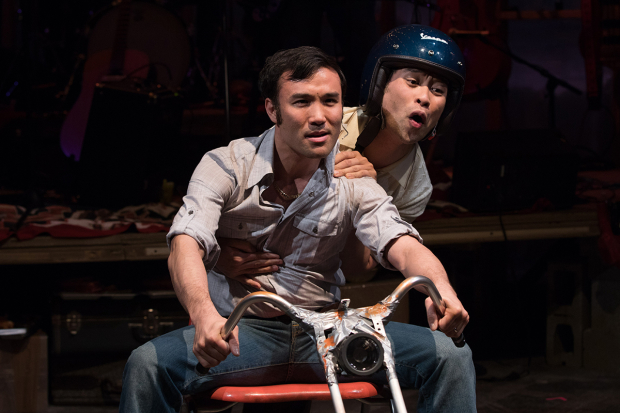
(© Teresa Wood)
At the beginning of Studio Theatre's Washington, DC, premiere of Vietgone, an actor comes onstage and announces that he is the playwright and that all the characters are fictional. But both statements are false. The actor in question, Jacob Yeh, plays many roles in the play's ensemble. The show's real author is Qui Nguyen, and it's his mother and father who are characters in Vietgone. Nguyen did not create this play to be an accurate historical representation of what happened during the Vietnam War. Instead, he offers a vivid, expressionistic, psychedelically colored set of scenes that serve as explosive devices to compel the next set of scenes to blow up onstage.
The play is set in 1975 and is, at its heart, a love story that tells how Nguyen's father, a super-heroic fighter pilot named Quang (Marc delaCruz), and mother, Tong (Regina Aquino), met and fell in love at a refugee camp in America.
During the fall of Saigon, Quang is talked into saving a group of Vietnamese by flying them out to an American aircraft carrier. But Quang's helicopter was one of those pushed over the side of the ship to make room for more aircraft to land, so he couldn't get home again. Along with many others, he was sent to Arkansas's Fort Chaffee.
Quang's mother had a very different route to Fort Chaffee. An employee of the American embassy in Saigon, she was given two first-class tickets out of the embattled city and took her mother, Huong (Eileen Rivera), with her.
Things are not as they seem in this play about Vietnam, love, and war. The Vietnamese characters speak perfect English, while it's the American characters that struggle linguistically. One American can only say, "Mozzarella sticks, tater tots, French fries!" Nguyen's work here is heavily influenced by comic books, action movies, and violent stage combat. It even includes a mega-fight where the hero and his best friend tangle with ninjas.
DelaCruz offers a sensational performance as Quang, whose superpowers are his sensitivity, his dedication to his family, and his intelligence, which allows him to realize that, even if he could get back to Vietnam, there would be nothing for him there but prison.
Aquino is equally impressive as Tong. Nguyen depicts her as a sexually motivated, nontraditional girl, totally uninterested in marriage and children. Aquino has a powerful voice and fills the tiny Space 4 at Studio Theatre with her renditions of the musical interludes of Vietgone, during which she is backed by a small band called the Vietgoners.
Rivera is hilarious as Tong's sex-hungry mother, who comes on to Quang the moment she sees him. Joe Ngo gives a solid turn as Quang's best friend Nahn, who convinces Quang not to return to Vietnam and instead make a new life in America. Yeh, Rivera, and Ngo play several other funny characters in the ensemble, including a young man who lusts after Tong, and two stoned hippies.
Director Natsu Onoda Power, an expert on manga (author of God of Comics: Osamu Tezuka and the Creation of Post World War II Manga), brings her experience to every detail of the musical, making each scene whirl and pop with excitement. Set designer Tony Cisek creates a space resembling a triangle for Vietgone, with the band at the apex of the triangle and the audience on three sides of the stage. Every inch of wall space is covered in posters of locations from Arkansas to Oklahoma to Saigon. Suitcases and boxes are piled everywhere.
The authentic sentiment of Vietgone comes as a surprise after all the vulgarity and political incorrectness in the body of the play. But the ending affirms Nguyen's own eccentric point of view about his parents — two lucky, loving immigrants who made their home in America.








